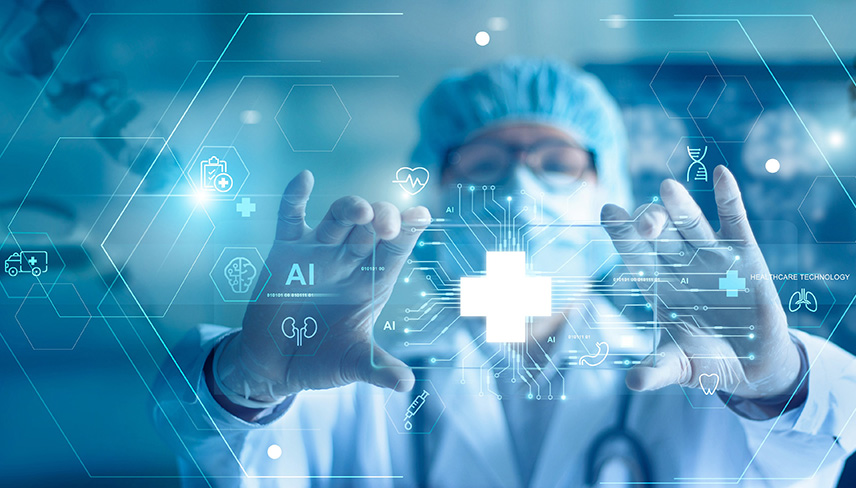The Future of Healthcare – The Evolution of AI and ML in Medical Devices

16 Apr 2024
Improving patient outcomes while ensuring privacy, security, and regulatory compliance
Picture this: a realm where artificial intelligence (AI) and machine learning (ML) aren't just buzzwords, but integral components of medical devices, particularly in the arena of electrical medical technologies and software. Although we've seen AI and ML in medical devices for many years, these rapid advancements and innovations in the sector are changing the industry as we know it.
Let's dive into the exciting world where cutting-edge technology meets healthcare. To break it down, AI and ML have the ability to add a whole new dimension to electrical medical devices. These devices aren't just pure instruments anymore; they've become so sophisticated, advanced, and 'smart' that they can analyze large amounts of patient data faster than you can say "diagnosis." Imagine an AI-powered ECG machine that spots irregular heart rhythms quicker than you can blink, or an ML-driven MRI scanner that pinpoints anomalies with unparalleled accuracy. That's the power we're talking about.
And it's not just about diagnosis. These smart devices also bring personalized care to a whole new level. They crunch the numbers – your overall medical history, genetic makeup, lifestyle factors –and tailor individualized patient-centric treatment plans. It's like having a personal healthcare concierge or practitioner right in your pocket (or on your wrist, thanks to the prevalence of wearable devices).
In this post-pandemic era, we would be remiss if we didn't consider telemedicine as well. With AI and ML in the mix, remote patient monitoring becomes a breeze. Wearable devices armed with these technologies keep tabs on your vital signs around the clock, sending real-time updates to your healthcare provider. So, even if you're miles away from the hospital living in a remote location or on a destination vacation, you're still under their watchful eye. Back-and-forth communication and easier connections to your provider are improving patient outcomes.
Integrating AI and ML into medical devices does come with its own set of challenges. We're talking about data security, privacy concerns, and navigating through the labyrinth of regulatory hoops. After all, we're dealing with sensitive patient information and data. It's crucial to ensure that these smart devices are incredibly secure and comply with all the nuanced regulations.
The challenges that need to be addressed with AI in medical devices include:
- Security Measures: Manufacturers should implement robust security measures to safeguard sensitive patient data and ensure the integrity of their devices. This involves encryption of data both in transit and at rest, implementing access controls to limit unauthorized access, and regularly updating software to patch vulnerabilities. Equally important to conduct thorough risk assessments and penetration testing to identify and mitigate potential security threats.
- Data Privacy: Given the sensitive nature of patient data, manufacturers must prioritize data privacy and adhere to strict regulations such as the Health Insurance Portability and Accountability Act (HIPAA) in the United States and the General Data Protection Regulation (GDPR) in Europe.
- Ethical Considerations: Manufacturers must recognize the ethical implications of AI in healthcare and strive to uphold ethical standards in their practices. This includes ensuring transparency and accountability in AI algorithms, avoiding biases in data collection and analysis, and prioritizing patient safety and well-being above all else.
- Interoperability and Integration: Manufacturers should understand the importance of interoperability and integration in healthcare settings, where multiple devices and systems must seamlessly communicate with each other.
- Continuous Monitoring and Improvement: As with all medical devices, even after a medical device with AI is deployed in the field, manufacturers must remain vigilant, continuously monitoring its performance and gathering feedback from users. This allows you to identify any issues or concerns promptly and implement corrective actions as needed. Investing in ongoing research and development to enhance the device's capabilities, improve user experience, and address emerging challenges and opportunities in healthcare should be a systemic part of your process.
In a nutshell, AI and ML are revolutionizing the way we diagnose, treat, and monitor patients, making healthcare smarter, faster, and more personalized than ever before. As we see the industry venture into this new frontier of medical technology, it's critical to innovate and evolve, while keeping patient safety and data privacy front and center.

Clarissa Benfield,
Global Director and Business Leader, Medical and Laboratory
With 15 years of experience supporting the Assurance, Testing, Inspection, and Certification industry, Clarissa is dedicated to Intertek's mission of bringing quality, safety, and sustainability to life. As a leader in the medical and laboratory space, she is passionate about working with manufacturers bringing innovative technologies and life-altering products to market.